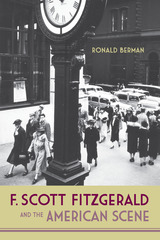
A study of the philosophical, intellectual, and political influences on the artistic creations of Fitzgerald and key early American modernist writers
F. Scott Fitzgerald and the American Scene continues Ronald Berman’s lifelong study of the philosophical, intellectual, and political influences on the artistic creations of key early American modernist writers. Each chapter in this volume elaborates on a crucial aspect of F. Scott Fitzgerald’s depiction of American society, specifically through the lens of the social sciences that most influenced his writing and thinking.
Berman addresses, among other subjects, Fitzgerald’s use of philosophy, cultural analyses, and sociology—all enriched by the insights of his own experience living an American life. He was especially interested in how life had changed from 1910 to 1920. Many Americans were unable to navigate between the 1920s and their own memories of a very different world before the Great War; especially Daisy Buchanan who evolves from girlhood (as typified in sentimental novels of the time) to wifehood (as actually experienced in the new decade). There is a profound similarity between what happens to Fitzgerald’s characters and what happened to the nation.
Berman revisits classics like The Great Gatsby but also looks carefully at Fitzgerald’s shorter fictions, analyzing a stimulating spectrum of scholars from more contemporary critics like Thomas Piketty to George Santayana, John Maynard Keynes, John Dewey, and Walter Lippmann. This fascinating addition to F. Scott Fitzgerald scholarship, although broad in its content, is accessible to a wide audience. Scholars and students of Fitzgerald and twentieth-century American literature, as well as dedicated Fitzgerald readers, will enjoy Berman’s take on a long-debated and celebrated author.
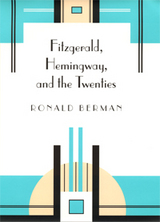
A noted scholar offers fresh ways of looking at two legendary American authors.
Both F. Scott Fitzgerald and Ernest Hemingway came into their own in the 1920s and did some of their best writing during that decade. In a series of interrelated essays, Ronald Berman considers an array of novels and short stories by both authors within the context of the decade's popular culture, philosophy, and intellectual history. As Berman shows, the thought of Fitzgerald and Hemingway went considerably past the limits of such labels as the Jazz Age or the Lost Generation.
Both Fitzgerald and Hemingway were avid readers, alive to the intellectual currents of their day, especially the contradictions and clashes of ideas and ideologies. Both writers, for example, were very much concerned with the problem of untenable belief—and also with the need to believe. In this light, Berman offers fresh readings of such works as Fitzgerald's The Great Gatsby, "Bernice Bobs Her Hair," and "The Diamond as Big as the Ritz" and Hemingway's "The Killers," A Farewell to Arms, and The Sun Also Rises. Berman invokes the thinking of a wide range of writers in his considerations of these texts, including William James, Alfred North Whitehead, Walter Lippman, and Edmund Wilson.
Berman's essays are driven and connected by a focused line of inquiry into Fitzgerald's and Hemingway's concerns with dogma both religious and secular, with new and old ideas of selfhood,and, particularly in the case of Hemingway, with the way we understand, explain, and transmit experience.
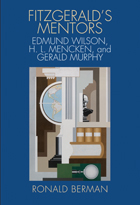
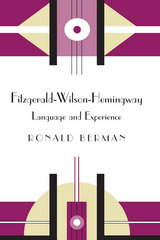
In this study, Ronald Berman examines the work of the critic/novelist Edmund Wilson and the art of F. Scott Fitzgerald and Ernest Hemingway as they wrestled with the problems of language, experience, perception and reality in the "age of jazz." By focusing specifically on aesthetics—the ways these writers translated everyday reality into language—Berman challenges and redefines many routinely accepted ideas concerning the legacy of these authors.
Fitzgerald is generally thought of as a romantic, but Berman shows that we need to expand the idea of Romanticism to include its philosophy. Hemingway, widely viewed as a stylist who captured experience by simplifying language, is revealed as consciously demonstrating reality's resistance to language. Between these two renowned writers stands Wilson, who is critically influenced by Alfred North Whitehead, as well as Dewey, James, Santayana, and Freud.
By patiently mapping the correctness of these philosophers, historians, literary critics and writers, Berman aims to open a gateway into the era. This work should be of interest to scholars of American literature, philosophy and aesthetics; to academic libraries; to students of intellectual history; and to general readers interested in Fitzgerald, Hemingway and Wilson.
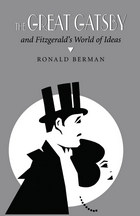
Great Gatsby was created--and challenges accepted interpretations of
Fitzgerald's greatest novel.
"The Great Gatsby" and Fitzgerald's World of Ideas
focuses on F. Scott Fitzgerald and the prevailing ideas and values
that permeated American society in the late teens and early twenties, providing
a vivid portrait of the intellectual and cultural milieu in which The
Great Gatsby was produced.
This new and original reading of Gatsby discloses
Fitzgerald's remarkable awareness of the issues of his time and his debt
to such philosophers and critics as William James, Josiah Royce, George
Santayana, John Dewey, Walter Lippman, H. L. Mencken, and Edmund Wilson.
Ronald Berman's fresh approach considers the meaning of various ideas important
to the novel: for example, those moral qualities governing both social
and individual life. Berman's reading of the text reveals extraordinary
emphases on matters that could productively be described as philosophical
-- the nature of friendship, love, and the good life. But the text of the
novel has many echoes, and the same concern with moral issues -- especially
those issues affecting democratic life - can be found in a number of other
texts of the first quarter of the century. Vigorously debated throughout
Fitzgerald's own lifetime, these texts shed a completely new light on the
idealism of The Great Gatsby and on the penetrating view it has
of life in a new form of American democracy.
A noted Fitzgerald scholar, Berman makes it clear that
accepted interpretations of The Great Gatsby and of Fitzgerald's
work in general must be changed. Berman demonstrates that Fitzgerald wrote
within a vast dialectic, relating the ideas of the twenties to those of
the "old America" described in so many of his works. Gatsby, Nick Carraway,
and the other characters of Fitzgerald's greatest novel all have to consider
not only their relationship to the present but also their distance from
what was once a highly meaningful past.

work. If Fitzgerald could have wished for one reader of The Great Gatsby,
it would have been Ronald Berman. Berman's criticism creates an ideal
companion piece to the novel--as brilliantly illuminating about America
as it is about fiction, and composed with as much thought and style."
-- Roger Rosenblatt
"An impressive study
that brilliantly highlights the oneness of Fitzgerald's art with the overall
context of modernism." -- Milton R. Stern, author of The Golden
Moment: The Novels of F. Scott Fitzgerald
"Citing films, dates,
places, schedules, Broadway newsstands, and the spoils of manufacture,
the author, never lapsing into critical jargon, locates the characters
in 'the moving present.' Gatsby, the first of the great novels
to emerge from B movies, uses the language of commodities, advertisements,
photography, cinematography, and Horatio Alger to present models of identity
for characters absorbed in and by what is communicated. . . . Berman concludes
that Gatsby 'reassembled' rather than 'invented' himself."
-- A. Hirsh, Choice
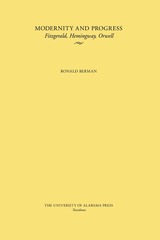
In the 1920s and ‘30s, understandings of time, place, and civilization were subjected to a barrage of new conceptions. Ronald Berman probes the work of three writers who wrestled with one or more of these issues in ways of lasting significance.
Hemingway, Fitzgerald, and Orwell all grappled with fluid notions of time: Hemingway’s absolute present, Fitzgerald’s obsession with what might be and what might have been, and Orwell’s concerns with progress. For these authors, progress is also tied to competing senses of place--for Fitzgerald, the North versus the South; for Hemingway, America versus Europe. At stake for each is an understanding of what constitutes true civilization in a post-war world. Berman discusses Hemingway’s deployment of language in tackling the problems of thinking and knowing. Berman follows this notion further in examining the indisputable impact upon Hemingway’s prose of Paul Cézanne’s painting and the nature of perception.
Finally, Berman considers the influence on Orwell of Aristotle and Freud’s ideas of civilization, translated by Orwell into the fabric of 1984 and other writings.
Ronald Berman is Professor of English at the University of California at San Diego and past chairman of the National Endowment for the Humanities. He is author of six books, including “The Great Gatsby” and Fitzgerald’s World of Ideas and Fitzgerald-Wilson-Hemingway: Language and Experience.
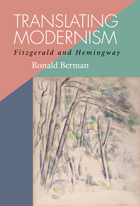
READERS
Browse our collection.
PUBLISHERS
See BiblioVault's publisher services.
STUDENT SERVICES
Files for college accessibility offices.
UChicago Accessibility Resources
home | accessibility | search | about | contact us
BiblioVault ® 2001 - 2024
The University of Chicago Press









